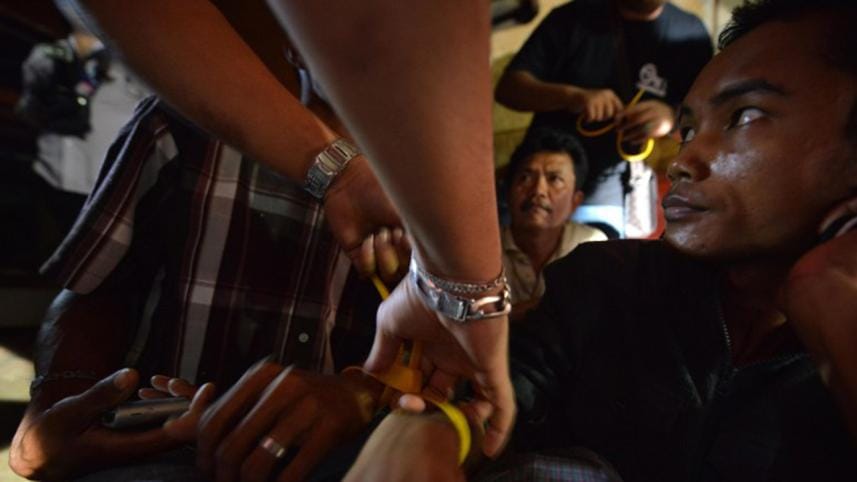Probe deaths in immigration detention centres: Rights body to Malaysia

Human rights body Fortify Rights has demanded Malaysia to investigate deaths in its immigration detention centres without delay and re-open an investigation into the human trafficking of Rohingya Muslims from Myanmar and Bangladeshis in recent years.
In an ongoing investigation, Fortify Rights, documented severe conditions in immigration detention centers in Malaysia as well as unchecked trafficking of Rohingya and Bangladeshi nationals to Malaysia from 2013 to 2015.
<br> -- 17 Bangladeshis among 118 foreigners died in 2015-'16<br> -- Malaysian govt rights watchdog releases report<br> -- Malaysia authorities 'failed to provide specific cause of death'<br> -- Fortify Rights calls for criminal investigation<br>
Fortify Rights is a non-profit human rights organisation based in Southeast Asia and registered in Switzerland and the United States, according to the rights body's official website.
118 foreigners including 17 Bangladeshis die in 2015-'16: Malaysia report
The National Human Rights Commission of Malaysia (SUHAKAM) published its annual report today, finding that a total of 118 foreigners died in Malaysia's immigration detention centres in 2015 and 2016.
Of the deaths, 63 are Myanmar nationals, 17 Bangladeshis, 10 Indonesians, six Indians and four from Pakistan. Other foreign nationals who died are from Cambodia, Nigeria, Nepal, Thailand, Philippines, Sri Lanka, Kenya and Tanzania.
SUHAKAM reported 83 deaths in 2015 and another 35 deaths up to December 20, 2016.
"A single death in immigration custody is unacceptable. More than 100 deaths are completely inexcusable," said Amy Smith, executive director of Fortify Rights.
"SUHAKAM's report should send shockwaves throughout the Malaysian government and elicit an immediate response," she said in a press statement today.
The causes of death reportedly ranged from sepsis or septic shock, leptospirosis -- a type of bacterial infection -- pneumonia, lung infections, and heart-related conditions. In 50 of the reported cases, the authorities apparently failed to provide the specific cause of death.
Fortify Rights called for the Malaysian authorities to conduct a criminal investigation into the deaths in immigration detention and for perpetrators to be held accountable, regardless of rank or position.
"These deaths can't be swept under the rug," said Amy Smith. "Those responsible must be held to account."
Former immigration detainees interviewed by Fortify Rights in Malaysia in 2016 described how Malaysian authorities detained them in overcrowded detention facilities for protracted periods of time with inadequate access to clean water, sufficient food, or healthcare.
One former detainee from Myanmar -- an ethnic Kachin man, 22 -- told Fortify Rights: "The guards gave us pink water to drink at breakfast. If you wanted water at other times, then you had to drink the toilet water."
Malaysia's Immigration Department implausibly claimed that detainees contracted illnesses prior to their detention.
A Rohingya woman from Myanmar, 19, diagnosed with tuberculosis told Fortify Rights: "I was beaten often by the guards because I asked for medicine. If I asked to see a doctor, then the guards would handcuff my hands above my head all day."



 For all latest news, follow The Daily Star's Google News channel.
For all latest news, follow The Daily Star's Google News channel.
Comments